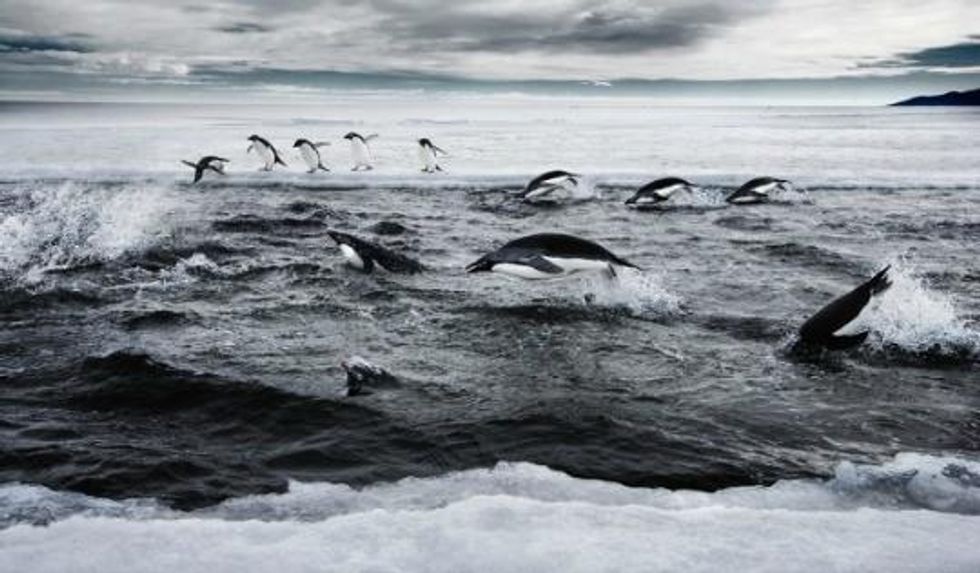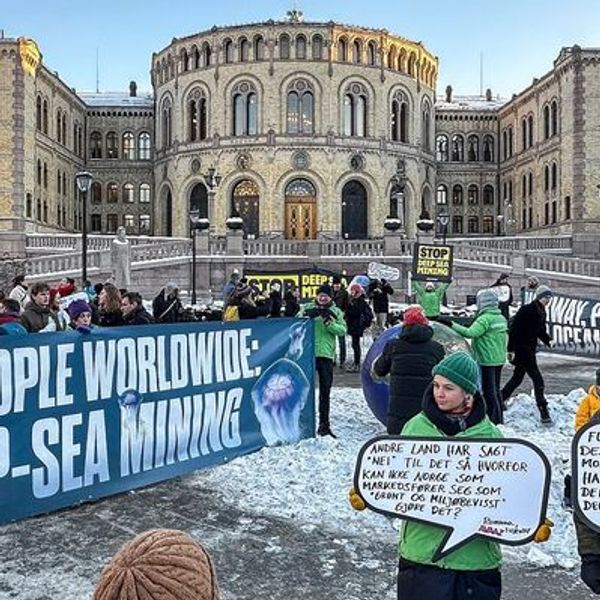World's 'Last Ocean' Now Up for Grabs Following Russia No Vote
Would-be world's largest marine conservation area fails to pass international committee

The agreement, which was crafted within the Commission for the Conservation of Antarctic Marine Living Resources (CCAMLR), whose 25 members have been meeting in Germany, would have established two massive Marine Protected Areas (2.3 million square kilometers) off the coastline of Antarctica and more than doubled the current area of protected ocean on the planet.
However, the proposal was essentially blocked on Tuesday by Russia, one of the few nations in the group who have fishing fleets in the region, in what campaigners called a "bad faith stalling tactic."
Mongabay.com calls the area "the most pristine marine ecosystem on the planet." The Ross Sea is home "to an abundance of penguins, whales, orcas, seals, and massive fish," and has thus far "largely avoided the degradation that has impacted much of the world's other marine waters," according to the environmental news site.
"[The] Ross Sea is the last open ocean tract (i.e. not a reef) that still has a food web much like what one would expect the 'Garden of Eden' to have been like. That is: all the 'fruits' are still there, ready to be picked," explained marine ecologist Dr. David Ainley in an interview with Mongabay.com.
Yet, as of Tuesday, as Steve Campbell of the Antarctic Ocean Alliance explains, "After two years of preparation, including this meeting, which Russia requested to settle the scientific case for the Ross Sea and East Antarctic proposals, we leave with nothing."
According to the Guardian, CCAMLR requires unanimous agreement from all of its 25 member states to create reserves.
"There is a question as to whether it can successfully create MPAs in the short term. Until Russia [has] a change of heart, it's not going to happen," said Pew Charitable Trust Southern Ocean sanctuaries director Andrea Kavanagh.
"All of the world's oceans -- including those around Antarctica -- are under increasing pressure that makes the protection of near pristine areas such as the Ross Sea and East Antarctica ever more urgent," said Richard Page, Greenpeace Oceans campaigner.
"Considerable effort and rigorous scientific work have been put in by many CCAMLR Members to get this far. Russia must now work in good faith and make sure the proposals go forward at the next CCAMLR meeting to ensure a lasting legacy for future generations."
"Antarctica's ocean is one of the most vulnerable on Earth," said Bob Zuur, of WWF's Antarctic and Southern Ocean Initiative. "I am incredibly disappointed that CCAMLR missed this opportunity to protect the home of more than 10,000 species including most of the world's penguins."
_______________________
An Urgent Message From Our Co-Founder
Dear Common Dreams reader, The U.S. is on a fast track to authoritarianism like nothing I've ever seen. Meanwhile, corporate news outlets are utterly capitulating to Trump, twisting their coverage to avoid drawing his ire while lining up to stuff cash in his pockets. That's why I believe that Common Dreams is doing the best and most consequential reporting that we've ever done. Our small but mighty team is a progressive reporting powerhouse, covering the news every day that the corporate media never will. Our mission has always been simple: To inform. To inspire. And to ignite change for the common good. Now here's the key piece that I want all our readers to understand: None of this would be possible without your financial support. That's not just some fundraising cliche. It's the absolute and literal truth. We don't accept corporate advertising and never will. We don't have a paywall because we don't think people should be blocked from critical news based on their ability to pay. Everything we do is funded by the donations of readers like you. Will you donate now to help power the nonprofit, independent reporting of Common Dreams? Thank you for being a vital member of our community. Together, we can keep independent journalism alive when it’s needed most. - Craig Brown, Co-founder |
Jacob Chamberlain is a former staff writer for Common Dreams. He is the author of Migrant Justice in the Age of Removal. His website is www.jacobpchamberlain.com.

The agreement, which was crafted within the Commission for the Conservation of Antarctic Marine Living Resources (CCAMLR), whose 25 members have been meeting in Germany, would have established two massive Marine Protected Areas (2.3 million square kilometers) off the coastline of Antarctica and more than doubled the current area of protected ocean on the planet.
However, the proposal was essentially blocked on Tuesday by Russia, one of the few nations in the group who have fishing fleets in the region, in what campaigners called a "bad faith stalling tactic."
Mongabay.com calls the area "the most pristine marine ecosystem on the planet." The Ross Sea is home "to an abundance of penguins, whales, orcas, seals, and massive fish," and has thus far "largely avoided the degradation that has impacted much of the world's other marine waters," according to the environmental news site.
"[The] Ross Sea is the last open ocean tract (i.e. not a reef) that still has a food web much like what one would expect the 'Garden of Eden' to have been like. That is: all the 'fruits' are still there, ready to be picked," explained marine ecologist Dr. David Ainley in an interview with Mongabay.com.
Yet, as of Tuesday, as Steve Campbell of the Antarctic Ocean Alliance explains, "After two years of preparation, including this meeting, which Russia requested to settle the scientific case for the Ross Sea and East Antarctic proposals, we leave with nothing."
According to the Guardian, CCAMLR requires unanimous agreement from all of its 25 member states to create reserves.
"There is a question as to whether it can successfully create MPAs in the short term. Until Russia [has] a change of heart, it's not going to happen," said Pew Charitable Trust Southern Ocean sanctuaries director Andrea Kavanagh.
"All of the world's oceans -- including those around Antarctica -- are under increasing pressure that makes the protection of near pristine areas such as the Ross Sea and East Antarctica ever more urgent," said Richard Page, Greenpeace Oceans campaigner.
"Considerable effort and rigorous scientific work have been put in by many CCAMLR Members to get this far. Russia must now work in good faith and make sure the proposals go forward at the next CCAMLR meeting to ensure a lasting legacy for future generations."
"Antarctica's ocean is one of the most vulnerable on Earth," said Bob Zuur, of WWF's Antarctic and Southern Ocean Initiative. "I am incredibly disappointed that CCAMLR missed this opportunity to protect the home of more than 10,000 species including most of the world's penguins."
_______________________
Jacob Chamberlain is a former staff writer for Common Dreams. He is the author of Migrant Justice in the Age of Removal. His website is www.jacobpchamberlain.com.

The agreement, which was crafted within the Commission for the Conservation of Antarctic Marine Living Resources (CCAMLR), whose 25 members have been meeting in Germany, would have established two massive Marine Protected Areas (2.3 million square kilometers) off the coastline of Antarctica and more than doubled the current area of protected ocean on the planet.
However, the proposal was essentially blocked on Tuesday by Russia, one of the few nations in the group who have fishing fleets in the region, in what campaigners called a "bad faith stalling tactic."
Mongabay.com calls the area "the most pristine marine ecosystem on the planet." The Ross Sea is home "to an abundance of penguins, whales, orcas, seals, and massive fish," and has thus far "largely avoided the degradation that has impacted much of the world's other marine waters," according to the environmental news site.
"[The] Ross Sea is the last open ocean tract (i.e. not a reef) that still has a food web much like what one would expect the 'Garden of Eden' to have been like. That is: all the 'fruits' are still there, ready to be picked," explained marine ecologist Dr. David Ainley in an interview with Mongabay.com.
Yet, as of Tuesday, as Steve Campbell of the Antarctic Ocean Alliance explains, "After two years of preparation, including this meeting, which Russia requested to settle the scientific case for the Ross Sea and East Antarctic proposals, we leave with nothing."
According to the Guardian, CCAMLR requires unanimous agreement from all of its 25 member states to create reserves.
"There is a question as to whether it can successfully create MPAs in the short term. Until Russia [has] a change of heart, it's not going to happen," said Pew Charitable Trust Southern Ocean sanctuaries director Andrea Kavanagh.
"All of the world's oceans -- including those around Antarctica -- are under increasing pressure that makes the protection of near pristine areas such as the Ross Sea and East Antarctica ever more urgent," said Richard Page, Greenpeace Oceans campaigner.
"Considerable effort and rigorous scientific work have been put in by many CCAMLR Members to get this far. Russia must now work in good faith and make sure the proposals go forward at the next CCAMLR meeting to ensure a lasting legacy for future generations."
"Antarctica's ocean is one of the most vulnerable on Earth," said Bob Zuur, of WWF's Antarctic and Southern Ocean Initiative. "I am incredibly disappointed that CCAMLR missed this opportunity to protect the home of more than 10,000 species including most of the world's penguins."
_______________________

